Music Foundation Year
 Option for Placement Year
Option for Placement Year
 Option for Study Abroad
Option for Study Abroad

International
Northumbria’s global footprint touches every continent across the world, through our global partnerships across 17 institutions in 10 countries, to our 277,000 strong alumni community and 150 recruitment partners – we prepare our students for the challenges of tomorrow. Discover more about how to join Northumbria’s global family or our partnerships.
View our Global FootprintBusiness
The world is changing faster than ever before. The future is there to be won by organisations who find ways to turn today's possibilities into tomorrows competitive edge. In a connected world, collaboration can be the key to success.
More on our Business ServicesResearch
Northumbria is a research-rich, business-focused, professional university with a global reputation for academic quality. We conduct ground-breaking research that is responsive to the science & technology, health & well being, economic and social and arts & cultural needs for the communities
Discover more about our ResearchAlumni
Northumbria University is renowned for the calibre of its business-ready graduates. Our alumni network has over 246,000 graduates based in 178 countries worldwide in a range of sectors, our alumni are making a real impact on the world.
Our AlumniIf you’d like to receive the latest updates from Northumbria about our courses, events, finance & funding then enter your details below.
* At Northumbria we are strongly committed to protecting the privacy of personal data. To view the University’s Privacy Notice please click here
 Option for Placement Year
Option for Placement Year
 Option for Study Abroad
Option for Study Abroad

Please note: This course is closed for September 2025 entry. From September 2026, Foundation Years at Northumbria are changing and will become integrated 'Extended Degrees'. Visit Music BA (Hons) (Extended Degree) for more information.
Do you have a passion for music? Would you like to develop your performance skills alongside an understanding of music history and knowledge of music theory?
The Music Foundation Year is a fully integrated programme with the BA (Hons) Music course, and will allow you to develop key musical skills in piano playing, theory and harmony.
During your studies, you will develop your performance skills in 20 one-to-one instrumental/vocal lessons with the same specialists who teach on our degree programme. The course will equip you with essential skills for a performer such as interpretation, effective practising and handling performance anxiety. You will build your knowledge of music theory, and the study of harmony will be delivered in a fresh, creative way using the piano and/or guitar. Your creativity will develop through improvisation, taking inspiration from the music you perform.
Our Foundation Year introduces you to music history by examining music in the everyday environment of the home, asking how music is made and consumed, and its function in society.
Whether you are a complete beginner or a highly accomplished pianist, you will develop piano playing skills needed for a career in music.
Upon successful completion of the Foundation Year, you can automatically continue your studies on the BA (Hons) Music degree where you will build upon the knowledge gained in this initial year. The Foundation Year gives you the space to focus on the one subject, music, developing the skills and knowledge you need within a Humanities environment.
Find out more about the Music Scholarships we offer: Instrument Scholarship and Choral Scholarship.
UCAS Code
W310
Level of Study
Undergraduate
Mode of Study
1 year Full Time followed by a further 3 years Full Time or 4 years with a placement (sandwich)/study abroad
Department
Humanities
Location
City Campus, Northumbria University
City
Newcastle
Start
September 2025
Fees
Fee Information
Modules
Module Information
Our students tell us about their learning experience studying Music BA (Hons) at Northumbria.
Our Department of Humanities includes the subject areas of Music, History, English Literature, English Language and Linguistics, Creative Writing and American Studies.
.jpg?modified=20201119191734)
Department

Study

Northumbria historian receives prestigious research prize.
Find out more.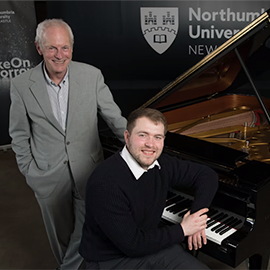
New music degree celebrates first graduating class.
Find out more.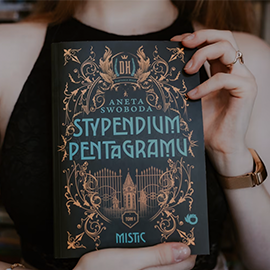
Northumbria student signs major book publishing deal.
Find out more.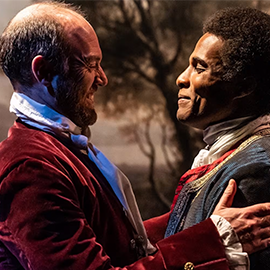
Northumbria Professor wins 'best new play' at national theatre awards.
Find out more.You will work in an environment in which all learning is informed by the academic expertise and research specialisms of our staff.
In performance, you will receive 20 hours of individual instrumental/vocal tuition. This is complemented by seminars covering strategies for practice/performing and performance practice, attendance at concerts and open rehearsals, and participation in masterclasses and workshops. This introduces you to the way performance is taught throughout the Northumbria Music degree.
Music history combines lectures with seminars based around group discussion of musical texts or broader questions, with seminars often led by students. Music history is brought alive in this module through visits to libraries, archives, houses and other institutions, where you will have the opportunity to engage with the primary source materials of music history, giving you insights into how music research is done.
Workshops allow you to develop practical skills and provide a means of putting theory into practice. For example, your theoretical knowledge of harmony will be developed through practical workshops involving the piano, guitar and improvisation on your instrument; you will learn to play the piano in small groups.
In preparation for your future career, the Foundation Year has a module introducing you to the music profession in which you will interact with musicians pursuing various career paths from all over the UK using video-conferencing as well as taking you out into the wider community, taking advantage of our partnerships with various musical and arts organisations.
Our staff are internationally renowned specialists in their fields and, having previously held positions in various universities across the UK, are highly experienced teachers. With their areas of expertise ranging from 16th-century music and performance practice to the history of instruments and American popular music, you will benefit from learning from outstanding scholars. You will also meet external professionals working in various areas of music and the arts, and will have tuition with highly accomplished and experienced instrumental and vocal specialists who also teach on our degree programme.
A personal tutor will be assigned to you during induction week who will help you manage the transition to university smoothly and successfully. They will continue to support you throughout the course of your studies, and can provide support for both your personal and academic development.
The programme leader and module tutors also play active roles in guiding you through your course with specific time allocated to students to allow for private feedback and consultation, giving you a great deal of individual support.
Our students learn from the best inspirational academic staff with a genuine passion for their subject.
Music is situated in the Sutherland Building and St James, which is immediately opposite. The Great Hall contains a new Steinway Model B grand piano and is used regularly for concerts and for end-of-year student recitals. Larger scale concerts take place in venues such as Newcastle Cathedral, with which we have a close relationship. Teaching spaces include another large space for performance classes as well as smaller rooms for other teaching. There are practice spaces large enough to take a small ensemble and for instrumental/vocal teaching to take place in them, and some further spaces including a sound-proofed practice studio. The ratio of practice spaces to students is currently around 1:5.
You will be provided with music software such as Sibelius to use on your own laptop and there are computer suites across campus for the completion of written work.
The University library, including books, reference works and a range of digital resources, will be available to you throughout the entirety of your study. You will benefit from our state-of-the-art electronic reading lists, which allow you to access resources for each module directly, and our electronic learning platform, Blackboard, will help you make the most of your independent study time.
Our new music facilities are based on the conceptual images below.
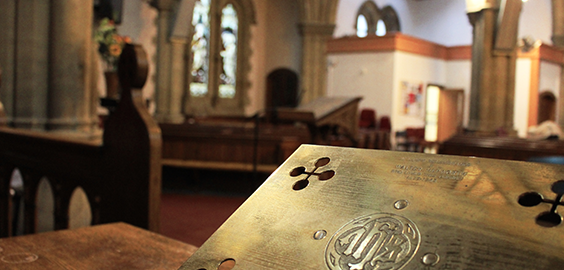
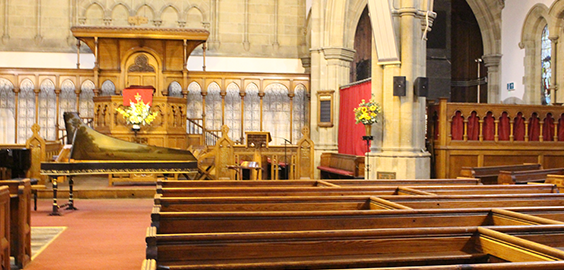
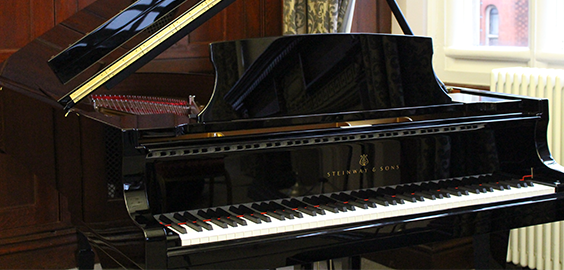
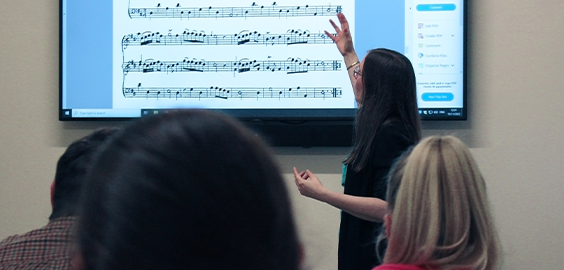
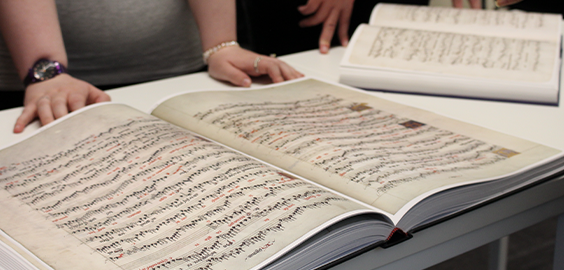
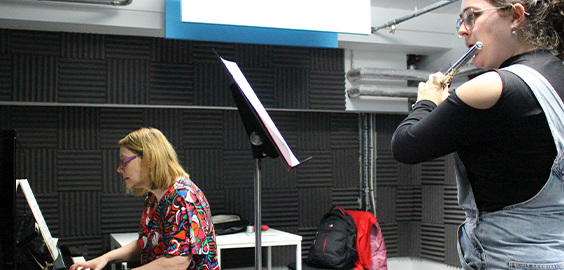
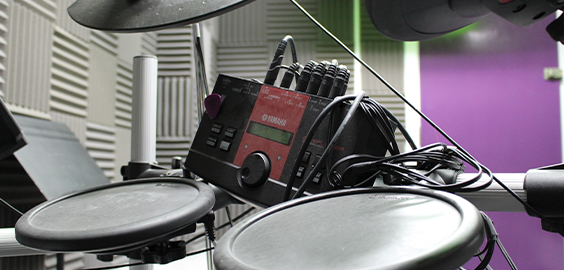
All music staff at Northumbria are engaged with producing research in their respective fields at an international level, and the team contains active professional performers. Their research is embedded into the Foundation Year, which greatly enriches the study of music. As a student, you will be taught by everyone on the academic staff.
From the onset, you will have opportunities to develop an understanding of how to research music through visits to libraries, archives and other institutions containing original source materials, which brings music history to life.
Throughout the duration of this course, you will experience research- and practice-informed teaching, which is both contemporary and innovative and will allow you to develop your musical skills and academic knowledge.
Successful completion of this course guarantees you a place on our BA honours Music degree. The Foundation Year and the Music degree are fully integrated, and have been developed together to allow a seamless transition from one to the other.
The year-long module 'Music in the Home' will furnish you with the intellectual skills you need for degree-level study, fostering critical enquiry and encouraging your curiosity. The dedicated performance strand prepares you for high-level study in the degree, where your individual lessons will be supported by seminars relating to the act of performance. The Foundation Year introduces the skills required to manage a freelance, portfolio career and work in arts administration, which are later developed upon in the BA (Hons) Music degree.
From first year through to final year and beyond graduation, we are here to help.
We have a fantastic service for students' to use to gain advice and tips on furthering careers and enhancing their employability.

Careers and Employment Services
You can boost your CV and develop your experience whilst studying at Northumbria.
Visit an Open Day to get an insight into what it's like to study Music Foundation Year. Speak to staff and students from the course and get a tour of the facilities.
80 UCAS Tariff points
From a combination of acceptable Level 3 qualifications which may include: A-level, T Level, BTEC Diplomas/Extended Diplomas, Scottish and Irish Highers, Access to HE Diplomas, or the International Baccalaureate.
Find out how many points your qualifications are worth by using the UCAS Tariff calculator: www.ucas.com/ucas/tariff-calculator
Northumbria University is committed to supporting all individuals to achieve their ambitions. We have a range of schemes and alternative offers to make sure as many individuals as possible are given an opportunity to study at our University regardless of personal circumstances or background. To find out more, review our Northumbria Entry Requirement Essential Information page for further details www.northumbria.ac.uk/entryrequirementsinfo
Subject Requirements:
As part of the application process all applicants are required to submit a video recording demonstrating their performance ability, and have a discussion with academics about their application. We do not require evidence of formal Graded Music examinations to join this programme but would typically expect applicants to be performing at around grade 6 level and have the ability to read music.
There are no subject requirements
GCSE Requirements:
Applicants will need Maths and English Language at minimum grade 4/C, or an equivalent.
Additional Requirements:
There are no additional requirements.
International Qualifications:
We welcome applicants with a range of qualifications which may not match those shown above.
If you have qualifications from outside the UK, find out what you need by visiting www.northumbria.ac.uk/yourcountry
English Language Requirements:
International applicants should have a minimum overall IELTS (Academic) score of 6.0 with 5.5 in each component (or an approved equivalent*).
*The university accepts a large number of UK and International Qualifications in place of IELTS. You can find details of acceptable tests and the required grades in our English Language section: www.northumbria.ac.uk/englishqualifications
UK Fee in Year 1: £9,535
* This is the tuition fee for your first year of study. You should expect to pay tuition fees for every year of study. The University may increase fees in the second and subsequent years of your course at our discretion in line with any inflationary or other uplift, as decided by the UK Government, up to the maximum amount for fees permitted by UK law or regulation for that academic year. To give students an indication of the likely scale of any future increase, the UK government has recently suggested that increases may be linked to RPIX ( Retail Price Index excluding mortgage interest payments) * Fees subject to annual increases over the course of the period of study. Students will be liable for payment of any/all tuition fees which are not sponsored by their employer or other third party.
International Fee in Year 1:
ADDITIONAL COSTS
There are no Additional Costs
* At Northumbria we are strongly committed to protecting the privacy of personal data. To view the University’s Privacy Notice please click here
Module information is indicative and is reviewed annually therefore may be subject to change. Applicants will be informed if there are any changes.
MU3001 -
Music in the Home (Core,20 Credits)
This module introduces you to music in the most intimate environment – the home. Topics vary from year to year, but range from the keyboard music of the seventeenth-century home or domestic music-making in the Tudor household to the family relationships of the Mendelssohns and Schumanns in the nineteenth century, and from the music-making of American soul artists to the partnership of Britten and Pears at the Red House in Aldeburgh. We open up three questions that are fundamental to the history and performance programme in our undergraduate degree as a whole: how music is made; how music is consumed; and how music shapes cultural change. As we do so, we explore the most personal side of music – how people express their experience of life through music-making, understanding how emotions, gender, sexuality, identity and social class can all be shaped by music.
More informationMU3002 -
Performance (Core,20 Credits)
This module is focused on your individual, one-to-one instrumental or vocal tuition. Working with a specialist on your instrument/voice, you will consolidate your technique while developing skills in performing music which will enable you to communicate effectively with an audience. The course will cover areas such as effective practising, dealing with performance anxiety, the importance of good posture both to music making and your health. You will expand your repertoire, and engage critically with musical performance through attendance at concerts and recitals.
More informationMU3005 -
The Music Profession (Core,20 Credits)
This module encourages you to think about different possible career paths in the music profession, and how they may be combined. It involves going out into the wider community to meet musicians working in differing contexts and environments. At the heart of the module is your engagement with musicians, usually in the places where they work. You will meet performers, scholars, teachers of various kinds, and music administrators. Many will be active in more than one of these areas; some will be employed, others working on a freelance basis.
This module is intended to get you thinking about the musical and generic skills you will need for various kinds of work in the music business. It will also encourage you to think about how the skills you acquire when studying music may be useful in other contexts, and the many and varied careers open to music graduates.
MU3006 -
Music Portfolio: Skills for University (Core,20 Credits)
This module will provide you with essential skills that will prepare you for academia, and for professional employment. You will learn through lectures, seminars and workshops. In these various forums, you will develop core knowledge in such necessary abilities as academic writing, research techniques, score analysis, aural skills, academic citation, public speaking, and presenting your work. With guidance from your seminar tutor, and working independently, you will write a 1500-word essay and an accompanying 500-word commentary that showcases the academic and professional transferable skills you have acquired.
More informationMU3007 -
Piano-Playing, Keyboard Harmony and Improvisation (Core,20 Credits)
You will develop your piano-playing skills according to your level of previous experience, developing piano technique and learning to play from notation (especially reading music at sight), which will complement your study of music theory. You will learn to play common chord progressions and use them to harmonize traditional tunes. You will develop an understanding of voice-leading at the piano (or how best to move from one chord to the next). You will explore the piano in creative ways through improvisation.
More informationMU3008 -
Theory and Musicianship (Core,20 Credits)
The module is designed so that you can work at a level appropriate to you. However, all students will cover the notation of rhythm and how it relates to pulse, metre and time signatures; pitch, scales and modes, key signatures; intervals; cycle of fifths; chords (major, minor, diminished, augmented); chords based on degrees of the scale.
More informationModule information is indicative and is reviewed annually therefore may be subject to change. Applicants will be informed if there are any changes.
MU3001 -
Music in the Home (Core,20 Credits)
This module introduces you to music in the most intimate environment – the home. Topics vary from year to year, but range from the keyboard music of the seventeenth-century home or domestic music-making in the Tudor household to the family relationships of the Mendelssohns and Schumanns in the nineteenth century, and from the music-making of American soul artists to the partnership of Britten and Pears at the Red House in Aldeburgh. We open up three questions that are fundamental to the history and performance programme in our undergraduate degree as a whole: how music is made; how music is consumed; and how music shapes cultural change. As we do so, we explore the most personal side of music – how people express their experience of life through music-making, understanding how emotions, gender, sexuality, identity and social class can all be shaped by music.
More informationMU3002 -
Performance (Core,20 Credits)
This module is focused on your individual, one-to-one instrumental or vocal tuition. Working with a specialist on your instrument/voice, you will consolidate your technique while developing skills in performing music which will enable you to communicate effectively with an audience. The course will cover areas such as effective practising, dealing with performance anxiety, the importance of good posture both to music making and your health. You will expand your repertoire, and engage critically with musical performance through attendance at concerts and recitals.
More informationMU3005 -
The Music Profession (Core,20 Credits)
This module encourages you to think about different possible career paths in the music profession, and how they may be combined. It involves going out into the wider community to meet musicians working in differing contexts and environments. At the heart of the module is your engagement with musicians, usually in the places where they work. You will meet performers, scholars, teachers of various kinds, and music administrators. Many will be active in more than one of these areas; some will be employed, others working on a freelance basis.
This module is intended to get you thinking about the musical and generic skills you will need for various kinds of work in the music business. It will also encourage you to think about how the skills you acquire when studying music may be useful in other contexts, and the many and varied careers open to music graduates.
MU3006 -
Music Portfolio: Skills for University (Core,20 Credits)
This module will provide you with essential skills that will prepare you for academia, and for professional employment. You will learn through lectures, seminars and workshops. In these various forums, you will develop core knowledge in such necessary abilities as academic writing, research techniques, score analysis, aural skills, academic citation, public speaking, and presenting your work. With guidance from your seminar tutor, and working independently, you will write a 1500-word essay and an accompanying 500-word commentary that showcases the academic and professional transferable skills you have acquired.
More informationMU3007 -
Piano-Playing, Keyboard Harmony and Improvisation (Core,20 Credits)
You will develop your piano-playing skills according to your level of previous experience, developing piano technique and learning to play from notation (especially reading music at sight), which will complement your study of music theory. You will learn to play common chord progressions and use them to harmonize traditional tunes. You will develop an understanding of voice-leading at the piano (or how best to move from one chord to the next). You will explore the piano in creative ways through improvisation.
More informationMU3008 -
Theory and Musicianship (Core,20 Credits)
The module is designed so that you can work at a level appropriate to you. However, all students will cover the notation of rhythm and how it relates to pulse, metre and time signatures; pitch, scales and modes, key signatures; intervals; cycle of fifths; chords (major, minor, diminished, augmented); chords based on degrees of the scale.
More informationTo start your application, simply select the month you would like to start your course.
Home or EU applicants please apply through UCAS
International applicants please apply using the links below
Call our clearing hotline now on +44 (0)80 0085 1085
If you’d like to receive the latest updates from Northumbria about our courses, events, finance & funding then enter your details below.
* At Northumbria we are strongly committed to protecting the privacy of personal data. To view the University’s Privacy Notice please click here
Back to top
